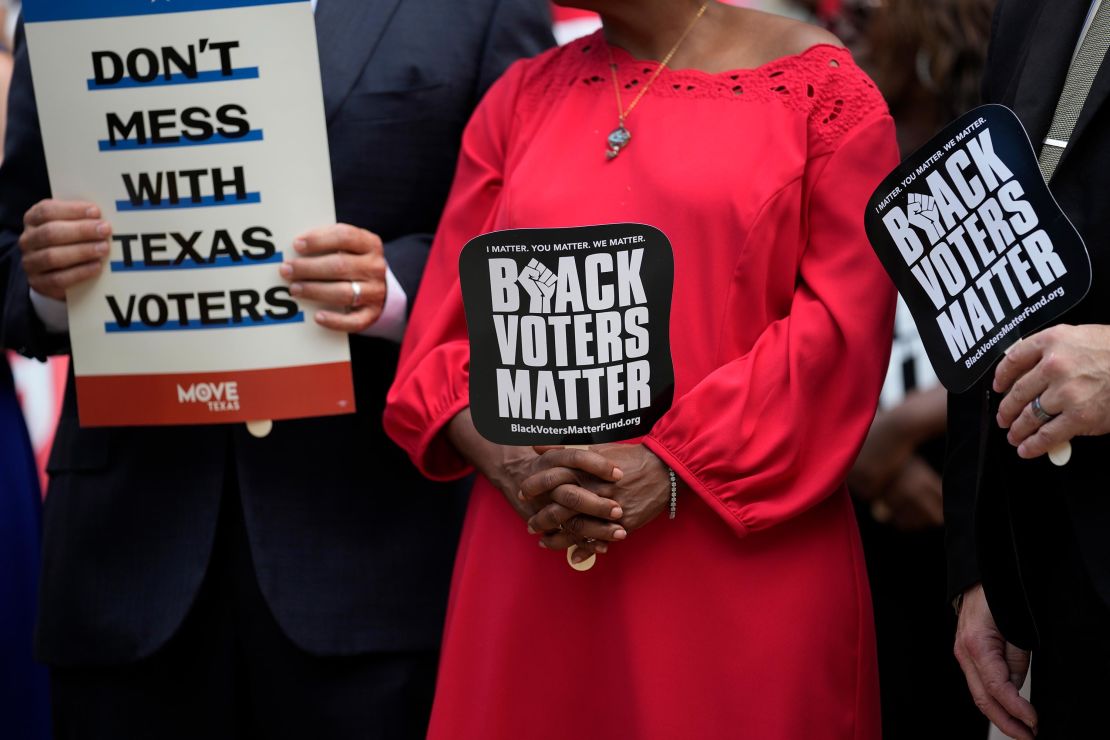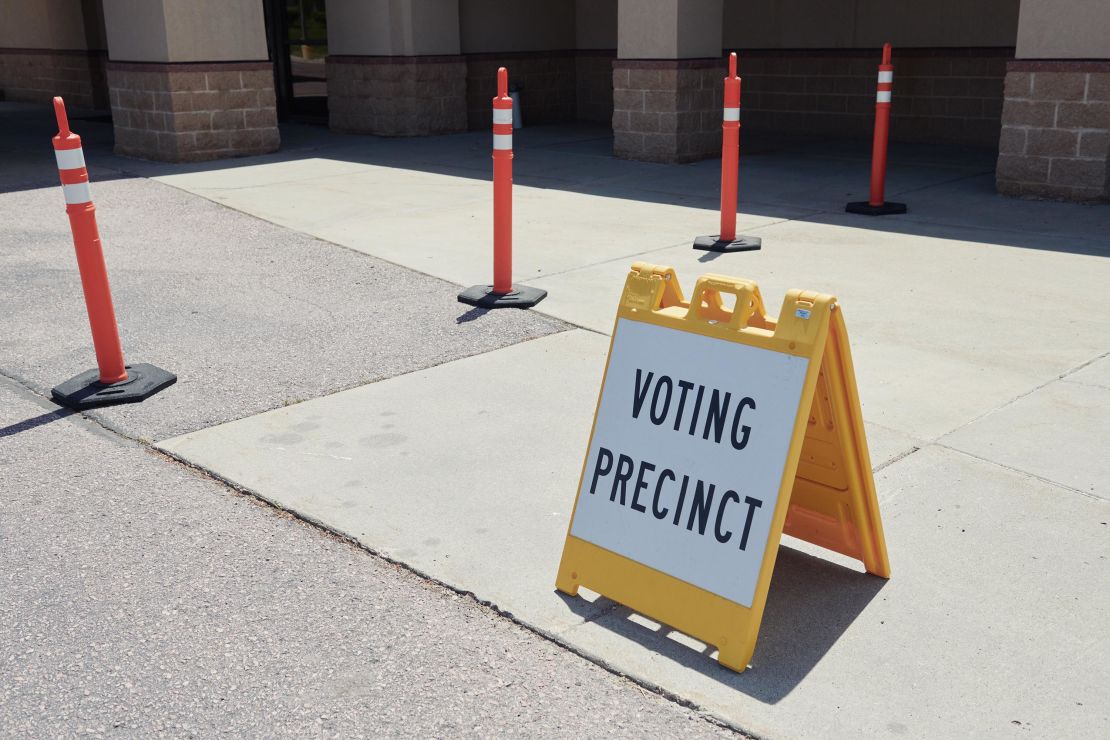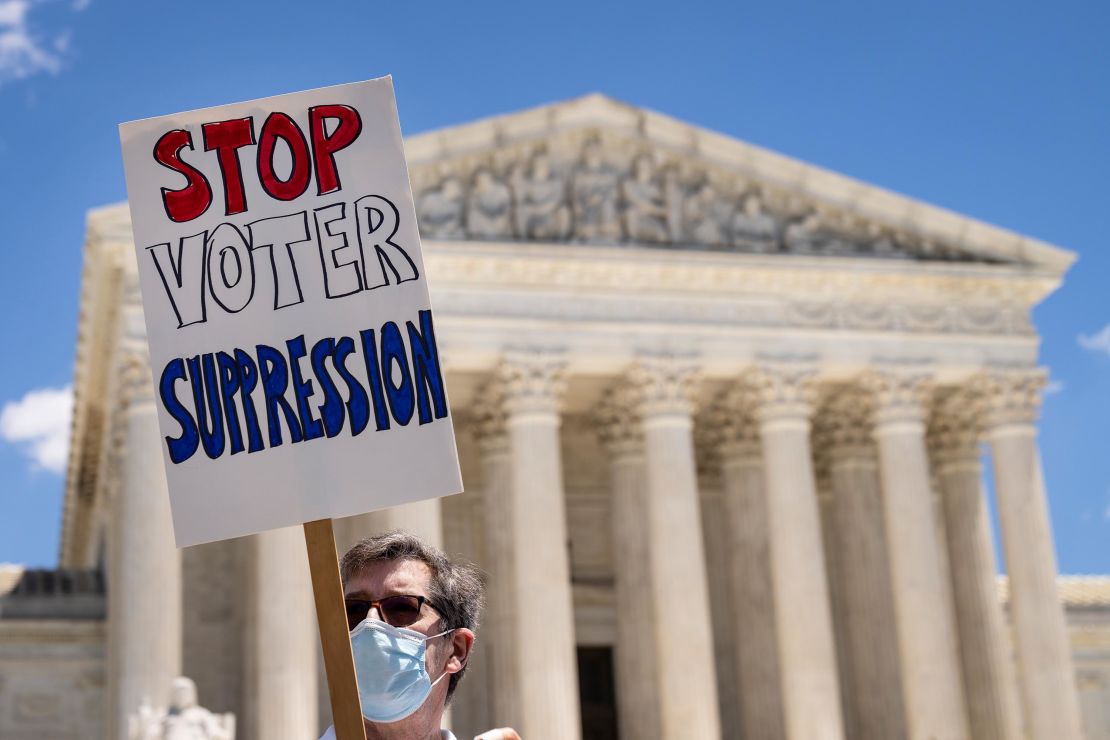A version of this story appeared in CNN’s Race Deconstructed newsletter. To get it in your inbox every week, sign up for free here.
At the beginning of the month, the 6-3 conservative-majority US Supreme Court essentially gave Republicans carte blanche to racially discriminate against voters.
Through its ruling in Brnovich v. Democratic National Committee, the Court mangled the landmark 1965 Voting Rights Act, whose protections had already been eroded in 2013.
The case was a sobering reminder that, while some Democrats like to respond to Republicans’ maneuvering to block access to the polls by saying that voters just need to, well, vote, the problem isn’t that constituents aren’t turning out.
After all, in the 2020 presidential election, Joe Biden won a record 81 million votes, even as the US was in the thick of the coronavirus pandemic.
The issue is that, all across the country, Republicans continue to enact legislation that restricts voting for those Americans – largely people of color – they don’t believe deserve political representation.
See, for instance, Georgia, which is facing a lawsuit from the Department of Justice over state voter suppression laws that activists and Democratic lawmakers say target Black Americans.
“Just saying ‘I will vote’ was not enough following slavery & Reconstruction; nor is it an adequate response to current historic systemic attacks on voting rights,” Black Voters Matter co-founder Cliff Albright wrote in a recent tweet.
Put a little differently, Republicans have made clear their eagerness to abuse and twist voting rights to their advantage – and without legislative action and meaningful court reform to defend the sanctity of the ballot box, the party will eventually insulate itself from voters.
Here are a few major voting rights stories that underscore the stakes of this history-making political moment:
Texas Democrats’ drastic move
What’s happening: Earlier this month, Texas Democrats suddenly left the Lone Star State for Washington, in an extraordinary attempt to deny their Republican counterparts the quorum necessary to pass anti-voting rights legislation.
It can be easy, in some ways, to view the Texas state lawmakers’ move purely as political performance: Democrats, too, like to disturb the normal order of things.
But that manner of thinking doesn’t appear to grasp why, exactly, Texas Democrats are so desperate; one has even launched a campaign for higher office since arriving in Washington, in the hope of ousting the Republican currently holding the seat.

Why you should care: Already, Texas is the most difficult state to vote in, according to a 2020 analysis from Northern Illinois University. Together, the two voting bills of concern – SB 1 and HB 3 – would increase that difficulty by imposing mail-in ballot restrictions, banning drive-thru voting and empowering partisan poll watchers (who, notably, have a fraught racial history), among other things that would disproportionately disadvantage people of color and other Democratic-leaning groups.
“The secretary of state’s office in Texas told us that our elections ran smoothly, securely, and were a success,” Texas Democratic state Rep. John Bucy III told CNN’s Erin Burnett. “So, you have to question what is the problem these bills are trying to solve? Clearly, all they are trying to do is make it harder for the people of Texas to vote, specifically individuals with disabilities, women and people of color.”
Indeed, what’s disturbing about these political machinations is that they’re designed to entrench Republicans’ power.
Or as the journalist Adam Serwer recently put it to me, “Public feedback is necessary for democracy to function. If politicians can get elected without regard for what the public thinks of them, then they have no reason to hew to the public’s preferences or respect their rights.”
Native Americans’ fight for political representation
What’s happening: Meanwhile, in South Dakota, Native Americans are suing the state.
The reason is that the state, they say, has repeatedly violated the National Voter Registration Act, aka the Motor Voter Act, a federal law that requires state governments to help people register to vote when they’re seeking services through the Department of Motor Vehicles or other offices that provide public assistance.

Why you should care: In violating the act, South Dakota has made it disproportionately harder for Native Americans to cast their ballots.
Earlier this month, the Lakota People’s Law Project, Kimberly Dillon of the Rosebud Sioux Tribe and Hoksila White Mountain of the Standing Rock Sioux Tribe joined the Oglala Sioux and Rosebud Sioux tribes in a lawsuit that began last September.
The plaintiffs have minced no words in pointing out how their voting experiences in deep-red South Dakota echo a Republican-fueled trend across the country – including in states such as Arizona and Montana – toward shrinking the power of Democratic-leaning groups.
“We see routine violations of federal law,” Chase Iron Eyes, lead counsel for the Lakota People’s Law Project, said.
“In 2018 and 2020, we worked hard with tribal governments and members to ensure that the voices of Native people were heard at the ballot box. Unfortunately, in many cases, systemic discrimination prevented that. That’s why we’re joining this suit. We’re battling a long history of racism and current nationwide efforts to install new Jim Crow-style laws,” he added.
The unsettling foundation being set in Arizona
What’s happening: Republicans aren’t inflicting all this damage on voting rights on their own. The US Supreme Court’s conservatives are helping.
“Tragic”: That’s how Justice Elena Kagan described the Court’s July ruling in Brnovich v. Democratic National Committee that clobbered what remained of the Voting Rights Act following 2013’s Shelby County v. Holder.
“The Court decides this Voting Rights Act case at a perilous moment for the nation’s commitment to equal citizenship,” Kagan wrote in a withering dissent. “It decides this case in an era of voting-rights retrenchment – when too many states and localities are restricting access to voting in ways that will predictably deprive members of minority groups of equal access to the ballot box.”
Native American activists have expressed this precise concern.
“The Supreme Court had an opportunity to protect our right to vote at a critical moment in our history, but instead decided to let discriminatory voting policies in Arizona stand, making it harder for Indigenous, Black and brown communities to vote,” Northeast Arizona Native Democrats said.

Why you should care: While at issue in Brnovich were two Republican-backed restrictive voting laws in Arizona – where the Navajo Nation played a crucial role in helping Biden put the reliably red state in the Democratic column for only the second time in 68 years – the Court’s decision will certainly embolden Republicans far and wide.
In addition, Brnovich confirmed that the Court’s conservative justices never cared about safeguarding voting rights for everyone.
Sure, they didn’t come to Donald Trump’s aid during the 2020 contest, when the blustering former President lied about widespread voter fraud in cities with significant Black populations. But as the attorney Jay Willis wrote in December, “The greatest trick the conservative legal movement can hope to pull off is convincing people that it was never really a threat.”
Kagan’s conservative colleagues are playing the long game. And it ought to be obvious which constituents they’re setting up to be the biggest losers.

